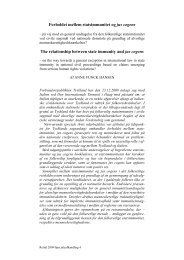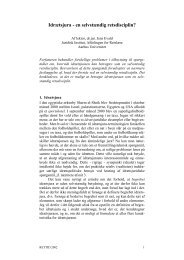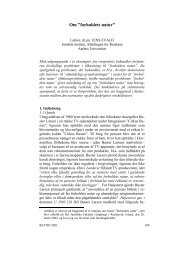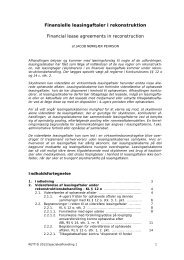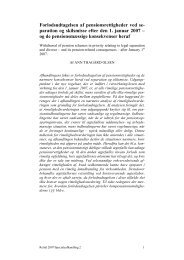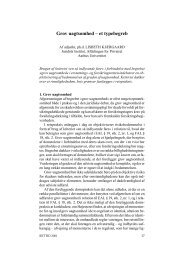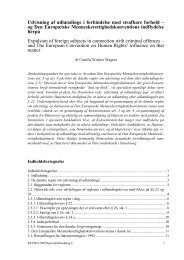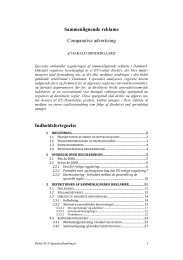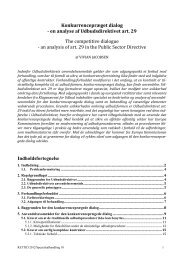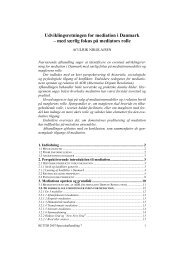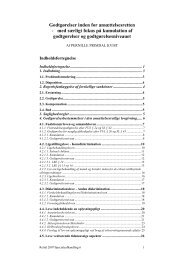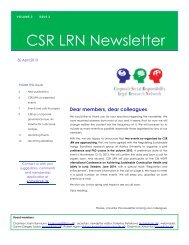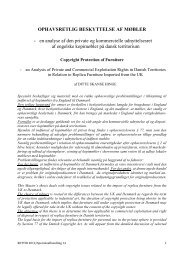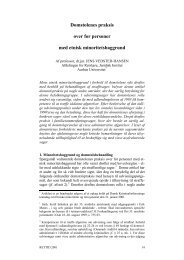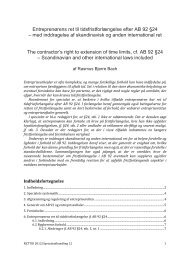Product liability under the CISG and Concurring tort law claims ...
Product liability under the CISG and Concurring tort law claims ...
Product liability under the CISG and Concurring tort law claims ...
Create successful ePaper yourself
Turn your PDF publications into a flip-book with our unique Google optimized e-Paper software.
taken into account when discussing <strong>the</strong> issue of concurring <strong>claims</strong>, since it adds to <strong>the</strong> advantages of applying<br />
<strong>the</strong> Convention <strong>and</strong> <strong>the</strong> uniform system provided <strong>the</strong>rein.<br />
4.4.4. Summary<br />
There are some protective interests <strong>under</strong>lying domestic product <strong>liability</strong> <strong>law</strong>s that would simply not be<br />
appropriate to dismiss <strong>and</strong> <strong>the</strong>re are some interest <strong>under</strong>lying <strong>the</strong> Convention that it would be ill-advised to<br />
allow circumvention of through domestic <strong>tort</strong> <strong>law</strong>.<br />
This complex issue requires courts <strong>and</strong> arbitrators to perform a balancing act, which is not easy, <strong>and</strong> agreeing<br />
on a uniform balancing act is even more difficult. It is, however, necessary in order to provide certainty<br />
in international trade <strong>and</strong> <strong>the</strong>refore it is very important to shed some light on <strong>the</strong> topic.<br />
In <strong>the</strong> following sections a proposal will be presented to determine where <strong>the</strong> line between contract <strong>and</strong><br />
<strong>tort</strong> should be drawn <strong>and</strong> which interests should be protected in this context, in order to find a solution to<br />
<strong>the</strong> issue of concurring <strong>claims</strong>.<br />
4.5. Circumvention of <strong>the</strong> <strong>CISG</strong> or domestic product <strong>liability</strong> <strong>law</strong>s<br />
When dealing with concurring <strong>claims</strong>, one of <strong>the</strong> most disputed topics in doctrine is whe<strong>the</strong>r to allow a partial<br />
circumvention of <strong>the</strong> Convention or of domestic product <strong>liability</strong> <strong>law</strong>s. Will placing <strong>the</strong> word '<strong>tort</strong>' at <strong>the</strong><br />
top of a claim release <strong>the</strong> buyer from <strong>the</strong> notice obligation in art 39 <strong>CISG</strong> <strong>and</strong> does it deprive <strong>the</strong> seller of<br />
<strong>the</strong> defenses that <strong>the</strong> Convention provides?<br />
As has been shown previously <strong>the</strong> considerations <strong>under</strong>lying <strong>the</strong> Convention are very different from <strong>the</strong> considerations<br />
<strong>under</strong>lying product <strong>liability</strong> <strong>law</strong>s. In this section <strong>the</strong> considerations <strong>under</strong>lying <strong>the</strong> noticerequirements<br />
in <strong>the</strong> Convention will be explored fur<strong>the</strong>r, in conjunction with <strong>the</strong> issue of circumvention of<br />
domestic product <strong>liability</strong> rules, in an effort to clarify what is at risk of being circumvented <strong>and</strong> in which situation<br />
circumvention will have <strong>the</strong> most detrimental effect.<br />
4.5.1. Considerations <strong>under</strong>lying art 39 <strong>CISG</strong><br />
According to art 39 <strong>CISG</strong> “<strong>the</strong> buyer loses <strong>the</strong> right to rely in a lack of conformity of <strong>the</strong> goods, if he does not<br />
give notice to <strong>the</strong> seller specifying <strong>the</strong> nature of <strong>the</strong> lack of conformity within a reasonable time after he has<br />
discovered it or ought to have discovered it. In any event, <strong>the</strong> buyer loses <strong>the</strong> right to rely on a lack of conformity<br />
of <strong>the</strong> goods, if he does not give <strong>the</strong> seller notice <strong>the</strong>reof at <strong>the</strong> latest within a period of two years<br />
from <strong>the</strong> date on which <strong>the</strong> goods were actually h<strong>and</strong>ed over to <strong>the</strong> buyer, unless this time-limit is inconsistent<br />
with a contractual period of guarantee”.<br />
Art 39 acts as <strong>the</strong> seller´s protection against a buyer, who calls into question a contract that has already<br />
been completed, by placing <strong>the</strong> seller in a position in which he is given <strong>the</strong> possibility to remedy a lack of<br />
RETTID 2012/Specialeafh<strong>and</strong>ling 26 32



